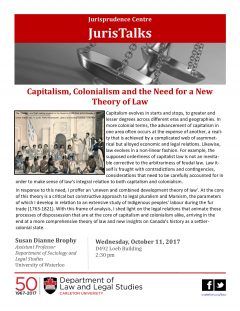with Susan Dianne Brophy, Assistant Professor of Sociology and Legal Studies, University of Waterloo. O
Capitalism evolves in starts and stops, to greater and lesser degrees across different eras and geographies. In more colonial terms, the advancement of capitalism in one area often occurs at the expense of another, a reality that is achieved by a complicated web of asymmetrical but alloyed economic and legal relations. Likewise, law evolves in a non-linear fashion. For example, the supposed orderliness of capitalist law is not an inevitable corrective to the arbitrariness of feudal law. Law itself is fraught with contradictions and contingencies, considerations that need to be carefully accounted for in order to make sense of law’s integral relation to both capitalism and colonialism.
In response to this need, I proffer an ‘uneven and combined development theory of law’. At the core of this theory is a critical but constructive approach to legal pluralism and Marxism, the parameters of which I develop in relation to an extensive study of Indigenous peoples’ labour during the fur trade (1763-1821). With this frame of analysis, I shed light on the legal relations that animate those processes of dispossession that are at the core of capitalism and colonialism alike, arriving in the end at a more comprehensive theory of law and new insights on Canada’s history as a settlercolonial state
